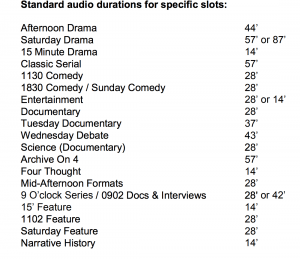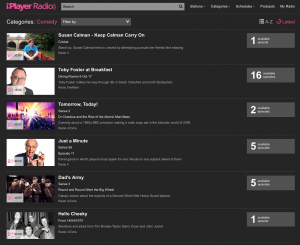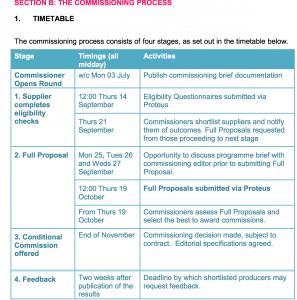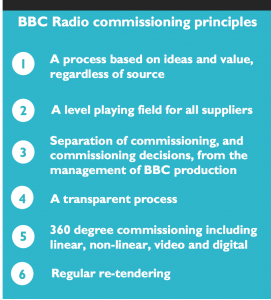The Radio 1 commissioning process is largely similar to that of Radio 4’s as we must again follow all the steps to become accredited as a BBC supplier which you find about here.However, in regards to how we would be pitching the idea, it would be vastly different and the final product would be significantly different from our original idea.
COMMISSIONING GUIDELINES
Radio 1 are looking for podcasts rather than that of traditional radio and the commissioning guidelines stress the importance of the finished piece being a podcast, not a radio programme that is turned into a podcast like with some of there pre-existing podcats e.g Greg James’ That what he said or Movies with Ali Plumb. BBC Radio 1 has been lacking a dedicated comedy slot for many years and this is aimed at changing this by making sure that it shows that BBC Radio 1 is ”unruly, infectious, and honest” (BBC,2017). The podcasts are also supposed to be talent lead meaning that in our podcast will revolve mostly around James leading the panel and the discussion as a whole alongside scripted elements that he delivers.
The guidelines also stress the importance of these podcasts being distinctive and being 100% original in regards to the ideas that are put into them and I would argue that our revised programme which you can find out about here is, especially for Radio 1’s audience has not had any political comedy let alone comedy for many years.
Another element that is stressed is that comedy has the potential to converse over areas that young people are interested in i.e politics as shown by young peoples engagement in the election and this means that we believe our idea would be suitable to pitch to radio 1 and politics allow us to fulfil the need being stimulating, exciting and require focused attention, as well as have spontaneity, energy and be provocative. For us, our panel members will also be crucial in whether we hit these goals as we will need people who are spontaneous and are provocative in their way of thinking at the same time as being funny, and i believe that we should potentially abandon the idea of it being clip lead and more conversationalist for these guidelines.
In relation to this is that the tone podcasts should be unguarded conversation be informal spontaneous again this will heavily relate to the way the piece is scripted as well as the contributors that we use with us needing to prioritise someone who can be spontaneous and speak their mind but at the same time be funny.
In terms of how many podcasts there are two options:
The first is a series based podcast which spans 12 episodes and the series needs to build a following for digital listening at the same time as having a strong narrative over 12 episodes, they must also be engaging and risk-taking by either innovation or being provocative alongside being informal and spontaneous.
The second option that we have is to produce a ‘mini-series’ of 2 to 3 episode that are riskier and/or play a role in developing new talent, this type of series lends itself to potentially becoming a longer series.
I believe that due to the nature of project we will be unlikely to fill 30 minutes on each month meaning that a shorter series of potentially six or three episodes would be much more likely for us to produce and allow us to not run out of material at the same time as not making the podcasts become dull and boring for the listener, as it should be engaging. Due to the nature of the audience, it also means that we would need to find political news stories that related to a young audience so that they can relate to what we are talking about.
This ultimately means we would pitch our podcast as a series of 3, due to its nature and the problem of potentially boring the listener if we had too many episodes due to the fact that they do not interrelate with one another. This type of series also lends itself to an extension outwards after we have more experience as
The Process
In terms of how we physically commision this again very similar to that of the process of Radio 4, we are required to submit a 250-word proposal for the first stage and fill out a questionnaire as to why we are an eligible company to work with. Once we have done this we would then be required to submit a full proposal which outlines all the relevant information for the following sections:
1- A detailed proposal responding to the commissioning brief that has been discussed above.
2- A section detailing the following:
The name of the person who would be dealing with the BBC on behalf of the production company.
The location of the production team
Evidence of that team having experience making relevant content
Talks with any relevant third parties that may be needed in order to fulfil the brief.
A strong budget outlining the cost per episode and where funding will come from if other sources are utilised.
Once this is submitted we would then pitch the idea in person to the commissioning team where we discuss and elaborate on the idea and answer any questions that may occur. This would then lead to us either signing a contract or not being offered a contract and if we were unsuccessful in the project we would then be offered feedback.
Assesment Criteria
The BBC will then assess our pitch in relation to three areas, these being: editorial proposal and capability (75%), value for money (20%) and risk (5%). In terms of the editorial proposal and capability, this means the programme must fit the network alongside a strong format that demonstrates innovation. It also outlines what experience a team should have, as they should understand the tone of the podcasts, have a knowledge of youth culture alongside having experience of on-air talent managing, plans for social media and have an appreciation of podcasts and spoken word programming.
We would also be assessed on Value for money meaning we would need to demonstrate a price per episode and have a strong financial plan to back up the project.
Finally, we would be assessed on the risk that it represents, with areas such as the BBC’s reputation, conflict of interests and the project complying with BBC policies.
Ultimately we would need to consider the criteria as to what the BBC commissioners are looking for in what we create and make sure that our project hits these as otherwise, we would never get the opportunity to put the programmes on.
This also allows me to fulfil and gain an understanding of the commissioning process for my learning objective as I now know what the BBC will expect from a finished product that they air and the process that commisioning a show goes through. I have also seen the differences between item to item as has been showing the difference between commisioning an ad hoc programme for Radio 4 that we initially decided upon before changing to create a podcast for Radio 1.



